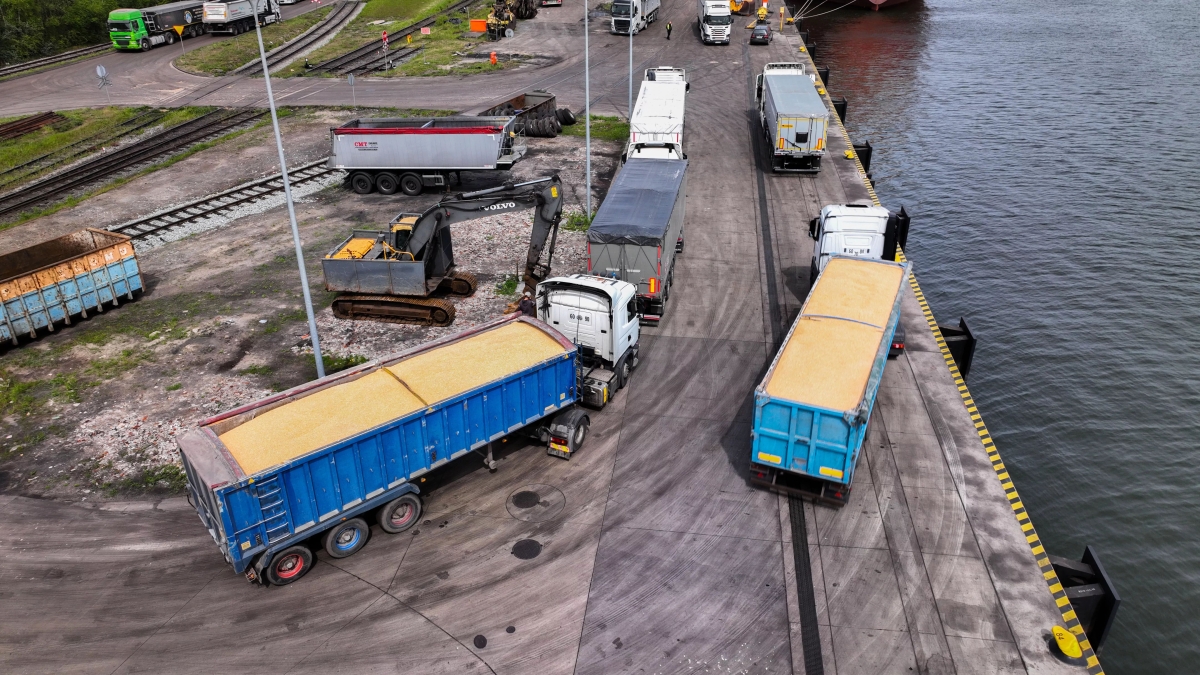
The port operators are constantly expanding their capabilities to handle agricultural products. Over the next two years, they plan to increase the grain handling capacity to 3 million tonnes. The forecast for this year is 2.5 million tonnes.
Currently, the following terminals at the Port of Gdańsk deal with grains: GBT/Malteurop at the Bytomskie Quay, Port of Gdańsk Eksploatacja at the Szczecińskie Quay, Magrol at the Zakręt Pięciu Gwizdków Quay, Gdańskie Młyny at the Zbożowe Quay, Speed at the Wiślane Quay and Siark-Port at the OPP Quay.
Along with energy resources, such as coal and liquid fuels, grain is a cargo group that is also treated as a priority at the Port of Gdańsk. It is transported mainly along export routes. This includes both Polish and Ukrainian grain. In 2022, more than 1.9 million tonnes of grain passed through the port quays. Since the beginning of this year, operators have already handled over 764 thousand tonnes of grain.
Ships with grain (meal, corn, wheat, rye, fava bean, rapeseed, oilseeds) are shipped mainly to ports in Denmark, the Netherlands, the UK, Germany, Finland, Sweden, Norway and Belgium. Overall, since the beginning of the year, the port has handled 115 ships taking grain and 3 ships arriving with grain.
The grain delivery and pick-up capacity to and from the main PGE, GBT, GDAŃSKIE MŁYNY and MAGROL terminals is 758 trucks and 71 wagons a day. Since the beginning of the year to April, 13,280 grain trucks were unloaded and 5 loaded at the Port of Gdańsk. When it comes to rail traffic, 1,827 wagons with grain were handled.
The Port of Gdańsk has buffer points for trucks. These buffer points are located on the following streets: Budowniczych Portu Płn. (150 parking places), Ku Ujściu (80 places), Załogowa (currently about 50 places, with a possible expansion up to 300) and Śnieżna-Handlowa (170 places). If there is congestion on the access roads to the port, the Port of Gdańsk Authority can allocate new areas for buffer parking lots – at Kontenerowa Street (for 600 vehicles) and Budowniczych Portu Płn. Street (for 150 vehicles).
“There is a big challenge ahead of us to transport the grain from Poland that is currently in storage. The export of such amounts of grain is possible only by sea. This is why the port operators have a difficult task in maximising their handling capacity. To make this easier, the Port of Gdańsk is working on preparing the infrastructure and rules for organising the main logistics channels, so that traffic to and from the port is as smooth as possible”, explained Kamil Tarczewski, Vice-President of the Port of Gdańsk Authority.
It is estimated that around 70% of the grain transported to the port in the near future will be done by trucks and then by ships. For this reason, as part of the preventive measures, the Port of Gdańsk Authority is preparing additional parking spaces and parking lots for trucks to help avoid traffic jams and congestions on public roads, such as the roundabout at Letnica.
After consultations with the Pomorski Road Transport Inspector, the port applied to the Gdańsk Road and Greenery Authority to provide buffer points for trucks. It also asked for the introduction of new traffic rules involving:
– changing of the traffic lights at the intersection of Marynarki Polskiej Street and Śnieżna Street to prevent turning into Szklana Huta Street.
– allocate the left lane on Marynarki Polskiej Street to drive straight towards the Nowy Port district and the right lane to turn into Śnieżna Street.
– separation of the lane of buffering points on Sucharskiego Street (old Sucharskiego).
Grain in the Port of Gdańsk is intended mainly for export. Right now, the port’s handling capacity is estimated at 300,000 tonnes per month, which means an annual turnover of 3.6 million tonnes.


